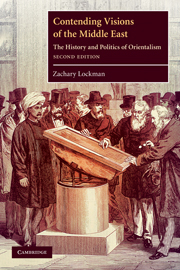Book contents
- Frontmatter
- Contents
- List of maps
- Acknowledgments
- Preface to the second edition
- Maps
- Introduction
- 1 In the beginning
- 2 Islam, the West and the rest
- 3 Orientalism and empire
- 4 The American century
- 5 Turmoil in the field
- 6 Said's Orientalism: a book and its aftermath
- 7 After Orientalism?
- Afterword
- Notes
- Bibliography
- Index
2 - Islam, the West and the rest
Published online by Cambridge University Press: 05 June 2012
- Frontmatter
- Contents
- List of maps
- Acknowledgments
- Preface to the second edition
- Maps
- Introduction
- 1 In the beginning
- 2 Islam, the West and the rest
- 3 Orientalism and empire
- 4 The American century
- 5 Turmoil in the field
- 6 Said's Orientalism: a book and its aftermath
- 7 After Orientalism?
- Afterword
- Notes
- Bibliography
- Index
Summary
By the end of the thirteenth century the era of the Crusades was essentially over: there was little interest or energy among western European Christians for further campaigns to regain the Holy Land. In Spain, however, the Reconquista continued until only Granada in the far south remained under Muslim rule, though many Muslims (and Jews) continued to live in the Christian kingdoms of Castile and Aragon. In the 1220s western Europeans first received reports that a powerful new invader had come out of central Asia and was attacking the heartlands of Islam. At first some believed that these defeats for Islam had been inflicted by the armies of the legendary Prester John, great king of a fabled long-lost Christian land somewhere in the East. It soon became evident that these invaders were not fellow Christians but the very same pagan, thoroughly terrifying and seemingly invincible Mongols (sometimes called Tatars) who overran much of Russia in the 1230s and by 1241 were attacking Poland and Hungary. The sudden death of the Mongol Khan (chieftain) in 1242 brought expansion into central Europe to a halt, but the Mongol conquest of Persia continued and in 1258 a Mongol army seized Baghdad and extinguished the ‘Abbasid caliphate.
These developments allowed Latin Christians to hope that the Mongols had been sent by God to destroy Islam once and for all, and efforts were made to secure an alliance with them.
- Type
- Chapter
- Information
- Contending Visions of the Middle EastThe History and Politics of Orientalism, pp. 38 - 65Publisher: Cambridge University PressPrint publication year: 2009

